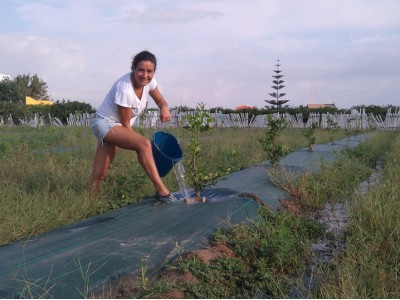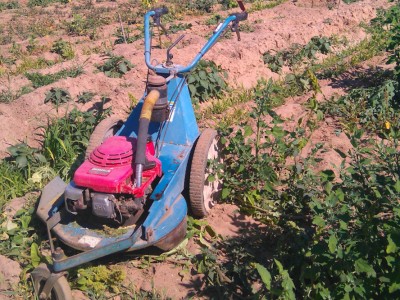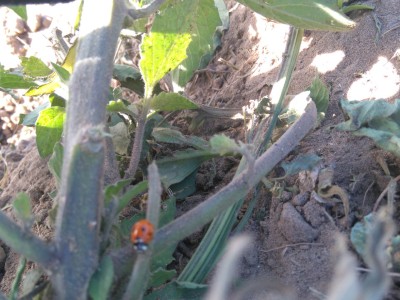
Until this year, my brother-in-law had adjacent land to our Clemenvilla field, which my father-in-law had stopped working 8 years before, as happened with many other orchards in our region, due to their lack of profitability. It was left to deteriorate, orange trees were uprooted, and weeds grew taller than me. This year, with an eye on the future of our business, we decided to acquire this land and venture into working it by planting more Clemenvilla and doing it in an organic way.
We are also aware of the interest of many of our customers in organic products. Besides, we personally believe in the future of this agricultural model for reasons like differentiation from the traditional model, fruit quality, economic and environmental sustainability, etc.
However, organic farming involves the application of specific and generally more complex techniques for sustainability, especially in combating pests if they appear, as well as a potential increase in labor for some tasks. Therefore, even though certain actions on the crops can be eliminated (such as the purchase and application of conventional pesticides), there may ultimately be an increase in production costs.
Unfamiliarity and distrust of these techniques, and of the organic model in general, are widespread among local small farmers. On one hand, there's the supposed risk of obtaining an unusable harvest or one that is rejected by conventional trade (for example, due to defects in the orange peel). On the other hand, with current prices in the conventional market, they couldn't sustain a possible increase in production costs, as their profits barely cover their own work expenses.
All of this makes the transition from conventional to organic farming not easy or quick. However, in our case, we are determined to try it with specialized guidance, as explained later. Meanwhile, and especially if things go well, we are trying to encourage some of the farmers who sell us their oranges to reduce or eliminate treatments, whether herbicides, pesticides, or fungicides (in fact, last year we already had a Navelina orchard without treatments, and this year we will probably have one as well).
We have opted for organic farming in both the new Clemenvilla plantation and the existing one. Furthermore, we have initiated the process to obtain official certification for both orchards. This takes about three years to grant, allowing the soil to wash out, checking for pesticide contamination from neighboring plots, or the use of herbicides, for example. Therefore, this year the Clemenvillas from our orchard will not receive any treatment, although we don't want to mislead anyone; they will not be legally considered organic until we are granted the corresponding certificate.
We are receiving guidance from a specialist agricultural engineer in organic citrus cultivation.

In the New Plantation
We have planted 260 Clemenvilla trees. During the summer, we have been watering them weekly, as they still have shallow roots, and it gets very hot in Cullera. So, we give them a lot of water; it comes through a channel to the plot and is then channeled through two small side trenches to the seedlings. From the trench, I take a bucket of water and pour it on each one of them. I call this "giving them a bottle."

Weeds
We cover the ridges with a strip of anti-weed fabric so that the seedling roots are free from competition with weeds. Between the ridges, we mow the tall weeds (they grow rapidly in the summer). With mowing, broad-leaved weeds will disappear, and grasses will prevail, forming a green cover that can coexist with the orange trees. This green cover will keep the soil "alive," unlike traditional crops, as it will retain more moisture, and fungi and insects will also live in it, helping to keep it mineralized and oxygenated.".

Pests
A few weeks after planting the "babies," I noticed that some of them had aphids. Aphids need to be eliminated, as they eat the seedling's shoots. Thinking about how to do it, and while consulting with the engineer and some colleagues, a few more weeks passed, and the weeds were growing fast. To my surprise, when I went to show Ximo, our worker, the aphids that the seedlings had, I couldn't find them. Without the application of any pesticides, they had disappeared. How? The weeds also attracted ladybugs, which are the natural enemy of aphids, and they ate them. For other pests, it might not be so easy, but this has been magical; no wonder they say that nature is wise. The rest, we will see...
In short, we are very excited about this project, and we spend the summer in the adjacent country house, nurturing it day by day, my husband and I.

Last winter was especially harsh in terms of weather in our town, Cullera. The storms from late November to late January spoiled a significant part of the orange and mandarin crops and made our harvesting and shipping planning very challenging. Also, our young organic plantation was quite damaged as the wind burned the seedlings, leaving them with hardly any leaves and in a sorry state. It was a tough time.
This spring, we had to replant a third of the seedlings. Fortunately, both the new and old ones have sprouted vigorously and are looking really nice. This regrowth also rekindles our enthusiasm. We wish they would grow faster, but they say that good things come to those who wait...
This year, ladybugs were not sufficient to control the "lice" infestation, and we had to treat them. We did so with Neem oil, a natural oil obtained from the seeds of an Indian tree with spectacular properties, both in agriculture and medicine, which also helped us combat the "citrus leafminer" worm. The result has been clearly positive.
After a year and a half without any chemical treatment, for our Clemenvilla tangerine harvest next year, we will be able to proudly display the "In Organic Conversion" certification.

Next January will mark two years since we applied for organic certification, which means that, according to regulations, we will have the certificate in January 2020.
Last winter has been very beneficial in terms of weather, and we are very pleased because the young trees are growing vigorously and look very promising. This summer, we removed the anti-weed fabric surrounding the seedlings because it was deteriorated, so the weeds required more work, and we are using mowing to control them.
However, the orchard that has been producing the Clemenvillas we've eaten in recent years (also in organic conversion) is not in great shape due to the damage caused by the storms from the previous winter. Nevertheless, at over 40 years old, even though its production has decreased, it continues to provide quality Clemenvillas.
Joan, the person in charge of caring for both plantations, with the help of Ximo, takes care of the trees meticulously: they spray them with Neem oil to control pests, water them regularly during the summer, and perform the other necessary tasks for a healthy and professional agriculture.

This year, the seedlings continue to grow, albeit slowly... The large orchard has been heavily pruned to see if it recovers with strength as it was in pretty bad shape. It's quite old and suffered from the storms two winters ago. Even so, despite reducing its production, it still provides quality Clemenvillas.
Joan, the person in charge of caring for both plantations, with the help of Ximo, takes care of the trees meticulously: they spray them with Neem oil to control pests, water them regularly during the summer, and perform the other necessary tasks for a healthy and professional agriculture.

This year, finally, the Clemenvilla harvest from our orchard will be officially organic. The young trees have barely started production. The old ones, after last year's pruning, have sprouted vigorously and look beautiful. However, due to the pruning, their vegetative mass is still moderate, and this is not a year of high production overall. There aren't many mandarins, but we can't complain; whatever the production, it's our achievement. Over these past three years, we have learned, gained experience, and strengthened our belief that organic farming in citrus is possible.
This past year, we rented two orchards for a period of 10 years with the purpose of converting them to organic farming. They are of the Clemenvilla and Lanelate varieties. These orchards were semi-abandoned by their owners, as is happening with many orchards in our region. The low profitability associated with conventional farming and trade, along with the aging of the farmers, has led many of these orchards to be left uncultivated, abandoned, or their trees uprooted. We are excited about these new projects because, despite being semi-abandoned, the trees are in good condition and are now in good hands.